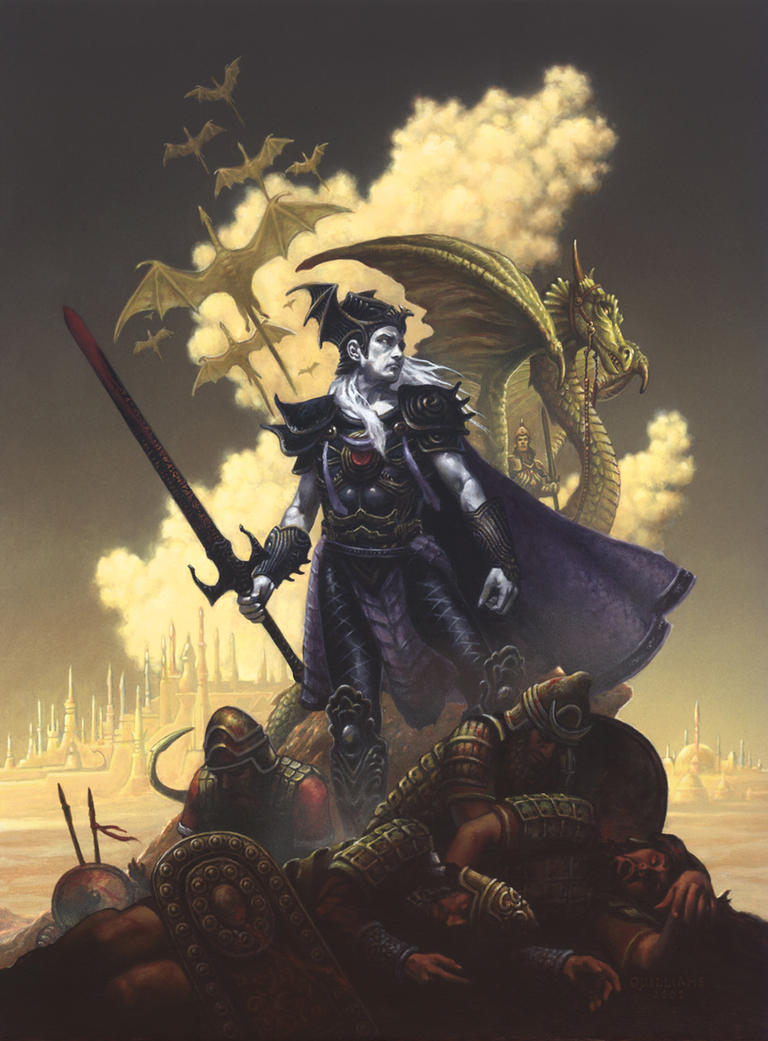By comparison, D&D started looking a bit boring - I could no longer accept Magic-Users being unable to use swords, for example. Eventually, I "got" lots of aspects and started ignoring the ones I dislike, and I fell in love with D&D again.
This whole thing color my preferences to this day. Even after D&D reclaimed its spot as my favorite RPG and I fully embraced levels and classes, I still like the option of customizing characters. Here is how I do it in B/X, for example.
The dilema is: how can I have a game with a maximum number of options without adding complexity or decision paralysis?
And my answer is: by taking away every mechanic that means nothing.
Well, there is another answer I should explain first. I realized that, as much as I like GURPS, I don't really need rules for an albino psychic with a bad back. What I DO need is some way of creating an albino sorcerer who can hold a sword, like Elric, or a strong warrior that can fight without armor or even kill an opponent with a chair, like Conan, because those characters are important in the Appendix N. And nowadays I do need paladins and clerics and "beastmaster" rangers, because they have become important D&D archetypes.
In short, I need at least one way to create every relevant archetype for the campaign I'm playing.
 |
| by ChrisQuilliams - Source. |
Well, old school D&D is simple enough and has enough methods of character creation, including multi-classing, dual-classing and so on (and even elves that can use swords and magics, so, Elric). Still, I feel this is still needlessly complicated.
The reason is that there are too many rules that mean nothing.
Take the "wizards cannot use swords" example; in old school D&D, there was a reason for that - the magic item charts. But if you're not using it, the rule accomplishes nothing, and creates lots of obstacles - now, for every new class, you must describe which weapons it allows, and so on. Last year, this caused me to write a whole series of articles about doing away with those limitations, starting here. It is amazing to think that, to this day, D&D still has rules concerning "wizards cannot use swords" (well, they can, but get no proficiency bonus, or they do, but they need a feat for that... why not just ignore this stuff and make everything simpler? A wizard with a sword is more likely to be hacked to pieces than to break the balance of the game).
But these limitations are not the only problem. There are whole concepts that could be thrown away without great loss. I know a lot of people will disagree here, but do we really need saving throw charts? What do they represent that cannot be better portrayed by a single saving throw (S&W style), or ability-based saving throws?
Basing this stuff on abilities, you can ditch saving throws and even different hit dice for different classes (check this, for example). Of course, you can go the other way and just ignore abilities altogether; everything is based on class instead (maybe like this?).
But having a lot of different mechanics (for example, a fighter with d8 HD, constitution bonus to HP, and good petrifaction saving throws) for a single archetypal trait ("Fighters are tough" or "dwarves are even tougher") seems like needlessly complex to me.
So here is my new design goal: one mechanic per archetypal trait.
Need an absent-minded genius? Intelligence is separated from perception (Wisdom) - that is why I have a hard time dealing with RPGs where wizards are necessarily charismatic. A fighter that can cast spells? We need some multi-classing or specific class for that too. A charismatic coward? Well, I guess will saving trows cannot use "the best of Charisma or Wisdom", then. A valiant, if inept, warrior? Then using Wisdom as the only option for courage will not do either. Characters that are better with swords than spears? Yeah, I probably need some form of proficiency or feats after all. And so on.
On the other hand, I really DON'T need a handful of different mechanics that all mean "deal more damage" (more attacks, more "crit range", re-roll 1s and 2s, minimum damage, is all pretty much the same to me) or "your skill or ability actually works", like some mechanics in Fifth Edition and other games. In this case, a single mechanic ("bigger strength", "better skill bonus") will do just fine for me.
I hope this allows me to have a game with almost as many character archetypes as 5e, but with half the page count - it would fit my preferences very well, and, maybe, would please other people too.

No comments:
Post a Comment